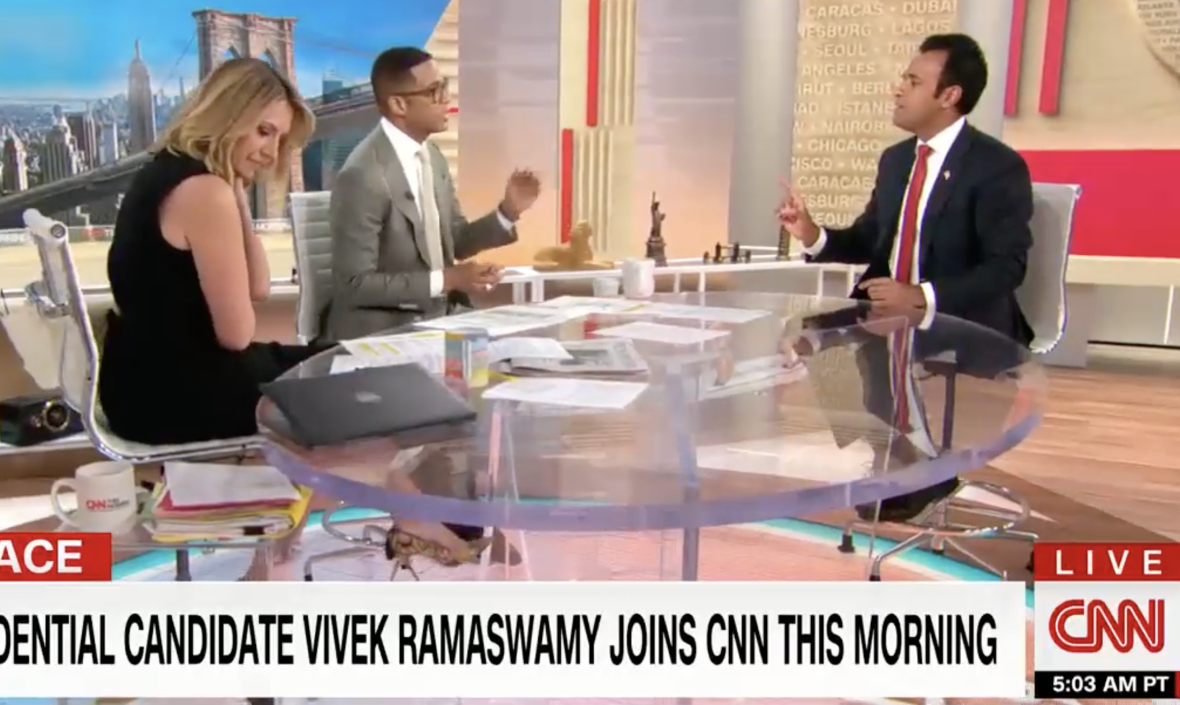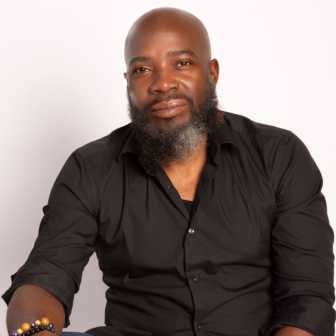A Republican whitesplaining Black history to Don Lemon shows why schools need more critical race theory
OPINION: GOP presidential Vivek Ramaswamy claims the Civil War was fought so Black people could own guns. Don Lemon (and facts) disagree. The post A Republican whitesplaining Black history to Don Lemon shows why schools need more critical race theory appeared first on TheGrio.

OPINION: GOP presidential Vivek Ramaswamy claims the Civil War was fought so Black people could own guns. Don Lemon (and facts) disagree.
Editor’s note: The following article is an op-ed, and the views expressed are the author’s own. Read more opinions on theGrio.
May this hall, where thirty-two years ago, the negro first entered upon the unequal contest for supremacy, and which has been reddened with his blood, now witness the evolution of our organic law which will establish the relations between the races upon an everlasting foundation of right and justice.”
— Louisiana Constitutional Convention President Ernest Kruttschnit, May 12, 1898.
Don Lemon is a Black man.
Don Lemon once lived in Louisiana.
He is not from Louisiana because no Black person is from Louisiana. Unless they grew up in New Orleans (which is a whole different state — the state of drunkenness), Black people are not from Louisiana; Black people survive Louisiana.
On Jan. 8, 1811, the enslaved people on Louisiana’s German Coast armed themselves and participated in the largest slave rebellion in the history of this nation. According to the Equal Justice Initiative, in the 10 years after the Civil War, Louisiana’s racial terrorists massacred more Black people (783) than all the other former confederate states combined (762). Aside from mass murder, the state also ranks fourth in lynchings (behind Mississippi, Texas and Georgia). It is the birthplace of “separate but equal,” the “grandfather clause” and legalized race-based voter suppression.
One of the ways Mississippi’s French wifecousin was able to etch its name in the Racist State Hall of Fame was by segregating Black people from their guns. While Louisiana is the most extreme example, when the 13th, 14th and 15th Amendments emancipated Black people, conferred citizenship and gave them equal rights after the great race war, large swaths of America instituted the practice of segregating Black people from their guns.
Vivek Ramaswamy says things.
Ramaswamy says he is running for president. but we all know he will not become president. He made hundreds of millions of dollars by starting a pharmaceutical company to sell the wonder drug that would treat Alzheimer’s even though he did not make an Alzheimer’s drug. And, as a leader in the “anti-woke movement,” Ramaswamy mostly just says things.
So, imagine how a Black Louisiana survivor who has reported on Philando Castile and Jaqueline Dixon and Atatiana Jefferson must have felt when he received an on-air lesson in Caucasian race theory from a pharmaceutical has-been who will never be president. Especially since, despite being a professional thing-sayer, Ramaswamy has been as silent as the NRA when lawful Black gun owners are killed while exercising their Second Amendment rights.
Well, that’s what happened to Don Lemon on “CNN This Morning” on Wednesday.
It began when co-anchor Poppy Harlow asked Ramaswamy about things he had recently said that most English dictionaries would define as “lies.” During a speech to the NRA, Ramaswamy said that the “first anti-gun laws were passed in this country” in 1865 (wrong, but we’ll get to that later). “We fought a civil war in this country to give Black Americans the equal protections under the law,” he continued. “The Democrat Party — then, as in now — wanted to put them back in chains.”
Something about this made Don Lemon mad.
Maybe Lemon knew that the first anti-gun law in America was passed long before 1865. To be fair, even though South Carolina and Virginia forbade enslaved people from owning guns, those laws were passed before America was technically a country. Don might’ve known that Louisiana’s 1806 Black Code prohibited enslaved people from carrying a firearm “even with permission to do so.” Or maybe Don knew Alabama’s 1852 slave code is what makes Ramawamy a liar. Or perhaps it’s Mississippi’s law banning all Black people from owning guns. Or New York’s or New Jersey’s or Connecticut’s or Pennsylvania’s. Don probably knew Ramaswamy was a liar because a real American would have to know at least one of these facts, right?
To be fair, when Harlow asked Lemon to participate in the conversation, he replied, “go on,” which is an African-American phrase that translates to “Nah, I’ve had my fill of white nonsense.” Perhaps, when addressing someone with a name as unseasoned as “Poppy,” Lemon should’ve used a more Caucasian-friendly term like “git” or “scram.” But Harlow insisted and, after giving a series of one-word answers that amounted to “aight,” Lemon spoke.
Lemon: I don’t really see what one has to do with the other … and using the Civil War to talk about Black Americans. That war was not fought for Black people to have guns.
Ramaswamy: That war was fought for Black people to have freedoms in this country, actually. That’s why the Civil War was fought.
Lemon: But that wasn’t fought for Black people to have guns. I think —
Ramaswamy: Actually, you want to know a funny fact is, Black people did not get to enjoy the other freedoms until their Second Amendment rights were secured. And I think that that’s one of the lessons that we learned.
Lemon: But Black people are still not allowed to enjoy the freedoms …
Ramaswamy: I disagree with you on it. I think you’re doing a disservice to our country.
Lemon: When you are in Black skin and you live in this country, then you can disagree with me …
After a contentious back and forth, Ramaswamy said, “Black people secured their freedoms after the Civil War is a historical fact, Don, just study it, only after their Second Amendment rights were secured …”
It’s easy to understand why Lemon was so mad about this part.
Confederate states seceded because they didn’t want Black people to be free. America fought a war to stop the confederate states from seceding. Emancipation was a consequence but not the point of the war. To believe that America fought a Civil War “for Black people to have freedoms” is not just historically inaccurate, it’s disrespectful to the memory of the great Abraham Lincoln, who said: “My paramount object in this struggle is to save the Union, and is not either to save or to destroy slavery.” In fact, when Union General David Hunter issued an order emancipating enslaved people in Florida, South Carolina and Georgia, Lincoln rescinded the order.
But the next part is what really irked Lemon.
Lemon: They did not secure their freedoms after the Civil War. You are discounting Reconstruction and a whole host of things that happened after the Civil War when it comes to African Americans, including the whole reason that the Civil Rights Movement happened, is because Black people did not secure their freedoms after the Civil War, and that things turned around when people tried to get the freedoms that were supposed to happen after the Civil War …
Ramaswamy: And you know how they got it? They got their Second Amendment rights. And the NRA played a big role in that. But today, Don..
Lemon: The NRA did not play a big role in that. That is a lie.
Ramaswamy: Absolutely, they trained Black Americans how to use firearms.
Lemon: Vivek, that’s a lie. That’s not — the NRA did not play a big role in that.
Lemon knows this white version of history that Ramaswamy is spewing is totally made up. Don lived and breathed in a state whose soil is still soaked with the spilled blood of Reconstruction’s racial terrorism and Jim Crow. He probably knew Congress passed the Enforcement Acts after the Civil War to stop white supremacist domestic terrorists from stripping Black people of their rights. The Enforcement Acts were ultimately overturned by U.S. v. Cruikshank — the first Supreme Court case involving Second Amendment rights. In the opinion, the justices essentially ruled that the federal government did not have the authority to stop terrorist organizations from taking Black people’s guns, even if the Black people were “bearing arms for a lawful purpose.” The case led to the Compromise of 1877, which led to the removal of Union troops from the South and the rise of Jim Crow.
If Lemon was not so upset, he might have asked Ramaswamy to explain why Congress had to pass the Enforcement Acts if Black people had secured their freedoms. Maybe the anti-woke czar could explain why Union troops were in the South in the first place if Black people were so free. The reason why the South became the land of Jim Crow, racial massacres and white supremacist violence was that the troops did not fight for Black people’s rights after the Civil War.
But you know what is weird?
The NRA was founded before the Colfax Massacre. Yet, when the highest court in the land said white supremacists could take Black people’s guns, the NRA didn’t protest. They didn’t do anything when California responded to the Black Panthers by passing gun reforms in the Mulford Act. The organization was nearly 50 years old during the Red Summer of 1919 when white mobs stripped Black people of their guns but didn’t show up. Why didn’t the NRA defend the Deacons for Defense or Ida B. Wells or the proprietors of People’s Grocery or Robert F. Williams or the Monroe, N.C. chapter of the NAACP during a shootout with the KKK? When has the NRA ever spoken out for Black gun owners?
Lemon probably wasn’t even upset about that “plantation” remark. He knows the proverbial “Democratic plantation” is a figment of white people’s imagination. Black people don’t love Joe Biden or the Democratic plantation any more than white people love Vivek Ramaswamy. For many Black people, the Democratic Party is just a political apparatus that partially shields us from the historical and present-day anti-Blackness that prevents us from securing our rights. In 1873, that imperfect but necessary political shield was provided by the Republican Party. In 2023, the Democratic Party is that tool. The names of the parties may have changed, but the demographics, geography and political ideologies are the same.
Don Lemon probably doesn’t hate Ramaswamy any more than Black people hate the Second Amendment, guns or the NRA. We own guns. We want rights. The reason Black people are so resistant to the NRA and people like Ramaswamy is not that we love the Democrats. Black people don’t even vote for Democrats; they vote for freedom. And, because they want to be free, they have to vote against Republicans. But it’s not that Republicans hate freedom …
It’s that Republicans hate Black people.
But that’s probably not what angered Don Lemon. He was probably bemused by Ramaswamy’s historical ignorance and the fact that so many dumb people actually believe it. What likely angered Lemon was Ramaswamy’s lack of creativity. It’s 2023. Google exists. History is accessible to everyone, and white people are still investing in the same arguments they believed in 1865. They could actually use some critical race theory.
And after surviving a century-and-a-half of terrorism, hate, and violence, Black people just want America to do one thing:
Go on.

Michael Harriot is a writer, cultural critic and championship-level Spades player. His book, Black AF History: The Unwhitewashed Story of America, will be released in September.
TheGrio is FREE on your TV via Apple TV, Amazon Fire, Roku, and Android TV. Please download theGrio mobile apps today!
The post A Republican whitesplaining Black history to Don Lemon shows why schools need more critical race theory appeared first on TheGrio.












